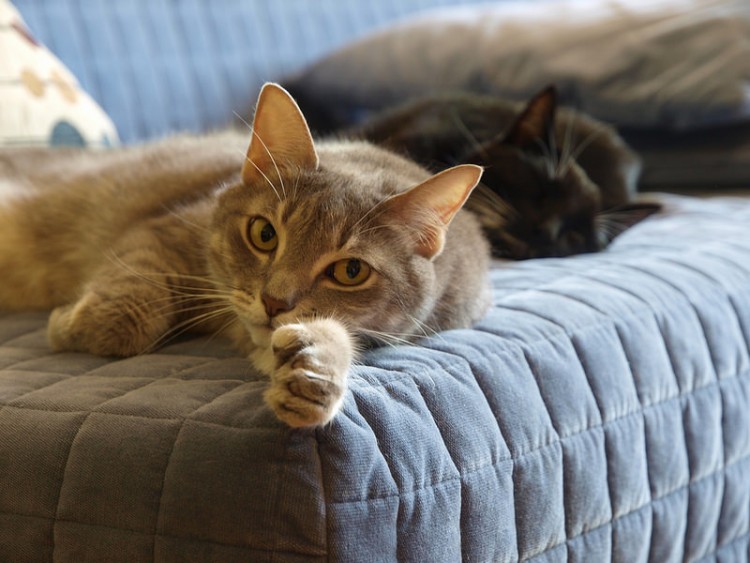
Do you know there are 5 distinct cat personality types?
If I drew up a list from my own cats, this is how the categories would shake out:
- The skittish missy (Noni)
- The hunter (Gromit)
- The “I’m human, aren’t I?” cat (Widget)
- Shy of her own shadow (Pilchard)
- Everybody’s friend (the dear departed Wallace)
Think of your own cats’ personalities — can you relate?
Personality in Numbers
A study from the University of South Australia came up with 5 personality types based on an analysis of a wider base of 3,000 cats.
To do this, the researchers sent out a questionnaire to an international array of cats (or, rather, their humans), and the results identified 5 distinct feline characteristics:
- Skittishness
- Outgoingness
- Dominance
- Spontaneity
- Friendliness
So what relevance does this have to our feline friends? Well, quite a lot, as it happens.
If you struggle with your cat’s behavioral problems or have 2 cats who don’t get along, it can help to understand what personality types they have. Then you can make adjustments around the home so that all the cats have what they need to feel happy and less stressed, which makes for a friendlier, more inclusive household.
So let’s take a look at how to recognize these personality types and what it takes to make that cat content.
1. The Skittish Cat
These are anxious or highly strung cats. Typically, they dart away when visitors call and would rather run underground than face a situation they don’t recognize.
Key to working with these cats is to give them plenty of opportunity to hide by providing holes (cardboard boxes work fine) throughout the house. Never force these cats to face their fears — this only traumatizes them.
They cope with life by avoiding fearful situations, and when they learn they are safe, it slowly builds their self-confidence.
2. The Outgoing Cat
Or “nosy,” in some cases — outgoing cats love to explore, investigate and generally get themselves into trouble by going where they shouldn’t.
These cats need mental stimulation. If bored, they can resort to destructive behavior, such as scratching furniture or house soiling. Too many also occupy themselves chasing fellow housemates.
The answer is to provide them with plenty of toys and actively play with them. Chasing a laser or a feather-on-a-string helps them vent energy and express natural behaviors.

3. The Dominant Cat
Unsavory as it is, the word “bully” sums up a dominant cat. These cats are less tolerant of others and liable to hog resources, such as food bowls and litter trays.
They can make a multi-cat household a misery.
If this is your trouble, provide more resources. Make sure each cat has her own food and water bowl, plus a litter tray. Place these resources some distance apart — then the boss cat can’t be in multiple places at once and hog them.
Was YOUR Pet Food Recalled?
Check Now: Blue Buffalo • Science Diet • Purina • Wellness • 4health • Canine Carry Outs • Friskies • Taste of the Wild • See 200+ more brands…

It also helps to play with this cat regularly (and all the others, too, of course) to take the edge off her energy levels.
4. The Spontaneous Cat
This isn’t about spontaneous party throwing so much as acting erratically.
This type of cat may react differently to the same situation on different occasions. This is often a case of a cat who hasn’t quite learned to cope with life and, when faced with uncertainty, runs first and asks questions later. He may also have to manage a mix of high energy and anxiety.
Never shout at a spontaneous cat (or any other, for that matter) — it will raise his anxiety levels and increase his erratic behavior. It helps to have set routines, such as feedings and playtime, so he knows when something is about to happen — which prepares him to behave more appropriately.
This friendly cat can’t get enough of her neighbor:

5. The Friendly Cat
This one needs little explanation — she’s the purr-y, head bunting, smush-against-your-shins type.
These cats are usually well adjusted, often as a result of superb socialization when they were kittens.
Friendly cats are everyone’s dream and most likely to live in harmony in a multi-cat household. However, if your friendly cat changes character, be sure to see a veterinarian. Many common conditions can induce irritability or pain that can change a cat’s personality.
Every cat is a blend of different personalities, just as people are. But by being alert to your cat’s personality traits, you can help him live with less stress and increased contentment, which is good news for everyone involved — both 2- and 4-legged.
This pet health content was written by a veterinarian, Dr. Pippa Elliott, BVMS, MRCVS. It was last reviewed Oct. 13, 2018.



